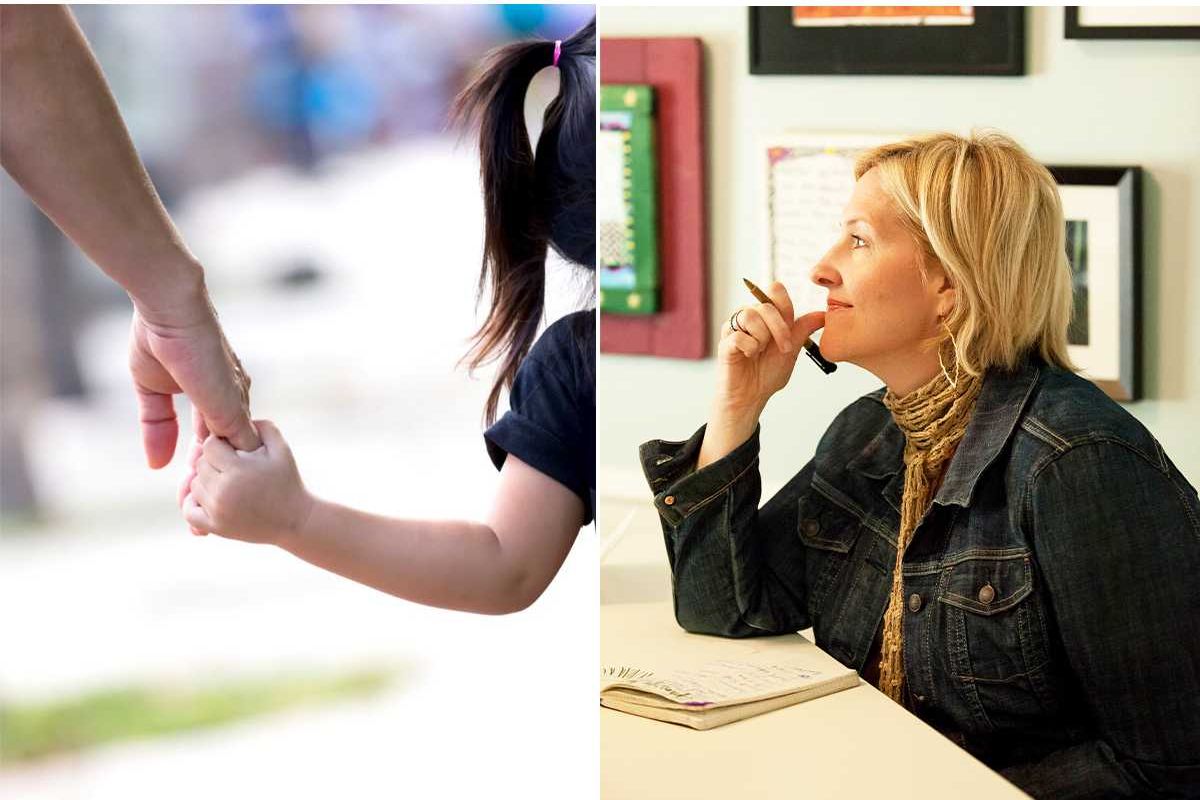Brené Brown reveals ‘marble jar lesson’ she uses to teach trust building with children and CEOs
“This is how we teach trust.”

Mother holds daughter's hand and Brené Brown.
Do you have trust issues? At some point in our lives, most of us are forced to reflect upon a difficult experience. Something that might make us question whether we should or can trust people again.
When Brené Brown's 4th-grade daughter came home crying after a classmate's betrayal, the moment turned into an unexpected lesson on building trust. Appearing on The Diary of a CEO Podcast, Brown reflected on how a simple demonstration for her daughter can be a healthy model that even top CEOs can use to better understand how trust works.

Brené Brown joinsThe Diary of a CEO Podcast
Brené Brown is a researcher and storyteller focusing on courage, vulnerability, shame, and empathy. Her website highlights a Guffington Foundation Endowed Chair, her professorship at the University of Houston, award-winning podcasts, and her authoring of six #1 New York Times bestsellers.
During her appearance on the podcast, she described how the experience with her daughter inspired the model that explains building and earning trust.
You can watch the short video here:
- YouTube www.youtube.com
Do you have any 'marble jar' friends?
Brown recalls the conversation with her daughter, Ellen, and explains her "marble jar" theory on the podcast. Knowing who to trust follows how many marbles you put in a jar for their favor. "Every time you share something with someone that's confidential and they don't share it, they get a marble. When you want to share something really private and personal, you look for a friend whose jar is full of marbles." This seems like a really smart way to visually explain the concept of earned trust with a child. Brown then asked her daughter, "Do you have any marble jar friends?"
Ellen had an immediate response, naming two friends—Hannah and Lorna. Ellen claimed the two young girls had big marble jars that were full. The reasons why Ellen explained their jars were full unlocked an understanding for Brown that demonstrates how we build trust.
Brown explains, "This was why. It was crazy." Ellen talked about how, when arriving late to lunch with nowhere to sit, her friend Lorna would scoot over and share the seat. Another example was when Ellen was sick with strep throat, Hannah was worried and called to see if she was okay. Another time, Hannah remembered Ellen's grandparents' names. Ellen thought that was really important and worthy of a marble, too.
Brown explains, "What was shocking to me is that Ellen was conveying that these marbles were being earned on these very small [things]: she knew my grandparents' name, she gave me a seat to sit at, [and] she checked on me when I was missing school. Trust is built slowly over time, a marble at a time. And that's how we teach trust to these most senior leaders in Fortune 100 companies."

Brown explains how the little things build trust, so you don't have to ask for it
Brown describes that, in crisis moments, many leaders believe asking for trust is the best way to get it. Brown claims this philosophy has very little to no value. She believes, "What matters is a leader that walks past you in the morning and says, 'Hey, good to see you Steven. How's your mom's chemo going?' Marbles. Marbles. Then, when the crisis happens, you don't need to say, 'trust me.' You just need to say what's on your mind. They trust you."

Why is building and earning trust important to our health?
A 2025 study in the National Library of Medicine found that trust over the course of a lifespan had a significant impact on a person's well-being. The results also demonstrated that individuals who experienced more situations and had more connections to trustworthy people predicted a longer lifespan. A 2025 study in MDPI found that social trust affected young adults' mental health through neighborhood interactions, reciprocity, and perceived work stress. It implied that mental health and psychological happiness were directly influenced by the framework of trust within the community.
Jennifer McKenna, a strategist and executive advisor in Fort Lauderdale, Florida, told Upworthy, "Trust may take time to build, but the return is priceless." She noted the value of trust in the workplace, saying, "People who trust each other don't take extra steps to verify information, and they don't create 'workarounds' for fear of what the other might think, say, or do. Additionally, trust perpetuates compassion, empathy, respect, and emotional safety, which gives everyone the freedom to spend less time second-guessing, and more time reaching their potential."
Karol Ward, a confidence expert and licensed psychotherapist, told Upworthy about the value of consistent behavior and the psychological safety built through trust. Ward said, "When you are not consistent in how your interact with others, they cannot trust how you will respond. Expressing rage, sarcasm, or withdrawing when hurt, creates instability within relationships. This causes fear or anxiety in another person because they cannot trust you. Then when you are back to being loving or kind and it is not reciprocated, you end up questioning why."
Helping her daughter navigate tough feelings created a perfect model for Brown to teach some of the world's most powerful leaders the means of earning trust. The marble jar theory is an effective tool that explains the best type of people to invest our trust in. The people who consistently do the little things that demonstrate they care are the most trustworthy.






 A woman is getting angry at her coworker.via
A woman is getting angry at her coworker.via  A man with tape over his mouth.via
A man with tape over his mouth.via  A husband is angry with his wife. via
A husband is angry with his wife. via 
 Some Boomer grandparents are being called out for "gramnesia".
Some Boomer grandparents are being called out for "gramnesia".

 A woman gets a tattoo.
A woman gets a tattoo. Boy playing on the computer.
Boy playing on the computer.
 Grumpy boomers aren't wrong about everything. Photo by
Grumpy boomers aren't wrong about everything. Photo by  Even the young people can't stand QR codes. Photo by
Even the young people can't stand QR codes. Photo by  Everything, even fast food, has gotten out of control expensive. Photo by
Everything, even fast food, has gotten out of control expensive. Photo by